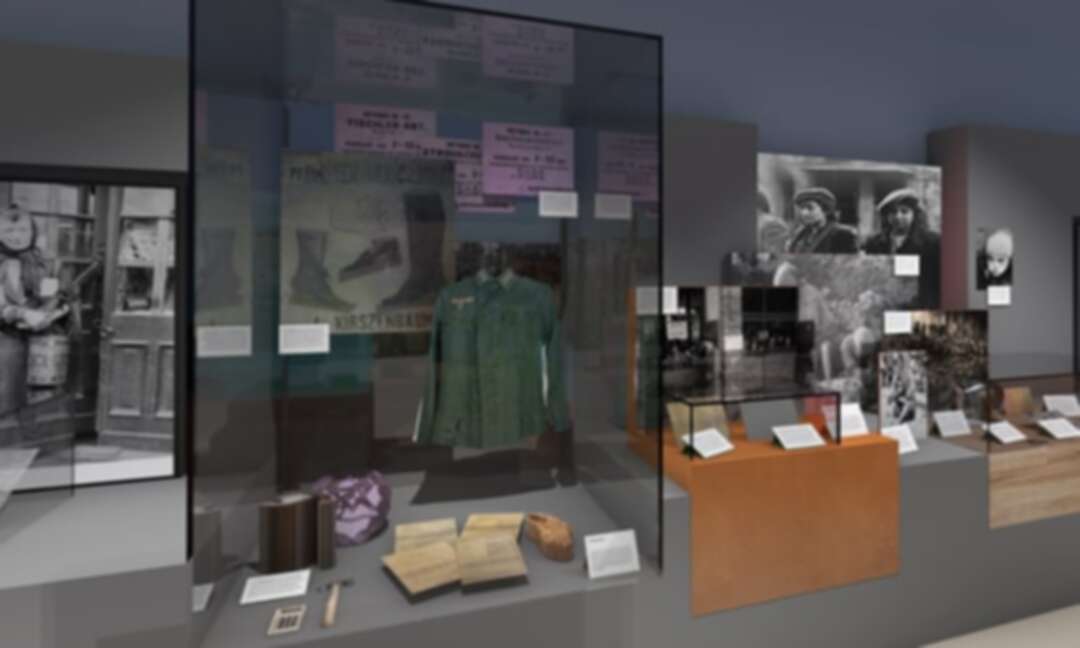-
Imperial War Museums gallery to question way Holocaust understood

Exhibition to challenge narrative that genocide happened in the shadows
A new Imperial War Museums gallery will challenge visitors to “beware the Holocaust because you could have been a perpetrator”.
It is believed the £30m gallery will become the first in the world focusing on the Holocaust to be integrated with a second world war gallery when it opens in London. It seeks to re-examine the narrative of the genocide of millions of Jews and others, who are being commemorated on Wednesday on Holocaust Memorial Day.
Taking a robust view of perpetrators, it will say: “The men – and women – who did this, they weren’t unaware of what they were doing,” said the lead historian on the project, James Bulgin.
“In many other respects they were relatively normal; they had kids, social lives, did the things we all do. And they also killed people. It wasn’t a machine that killed people, which is what Holocaust galleries and representation have tended to suggest.”
While the Holocaust has attracted a great amount of historical and scholarly attention, with about 4,000 new books a year, the temptation had been to “push it to the margins”, to think of it in isolation and separate from what was going on elsewhere, he said.
The galleries – due to open in the autumn and with a fundraising appeal still running – will be brightly lit. Most such exhibitions are dimly lit because the subject is dark. “But that suggests it happened in the shadows, that nobody really knew about it, and the only way we can response to it is through silence. We think that is problematic. Because it happened in daylight, and it happened over a vast, vast landscape,” Bulgin added.
The Holocaust has become defined by centralised “tropes” – Auschwitz, trains, people being selected left and right on ramps, anonymous piles of shoes. Yet the majority of those murdered weren’t selected like that, except at Auschwitz. It happened because of European rail networks, collaboration between different people and organisations and businesses across Europe working together, Bulgin added.
Amon Goeth, played by Ralph Fiennes in the film Schindler’s List, was an outlier regarded by contemporaries as a “psychotic, radicalised dangerous individual”. “The tendency to make him the metonym for all Nazis is comforting,” said Bulgin, “because you think he’s so far away from me, he’s nothing like me.
“But the vast majority of the people responsible for these things were infinitely more ordinary and more normal than that.”
The galleries would challenge the “ongoing, persistent determination to think of the perpetrators as brainwashed, hyper-radicalised people”.
 The V-1 bomb that will occupy a space between the new Holocaust gallery and second world war exhibition.
The V-1 bomb that will occupy a space between the new Holocaust gallery and second world war exhibition.“That’s not how it really was. Holocaust museums for years have been asking visitors: ‘Beware the Holocaust because you could have been a victim.’ I suppose we are thinking: ‘Beware the Holocaust because you could have been a perpetrator.’”
Through testimonies and artefacts, it would aim to take victims out of victimhood, Bulgin added, to see them as “people who were born, who were living their lives, and the interruption of those lives shouldn’t be the only thing that defines them”.
Objects loaned from institutions across the world will include a V-1 flying bomb – or doodlebug – that will occupy a space between the Holocaust gallery and the second world war gallery. Other artefacts include the birth certificate of Eva Clarke, who miraculously survived after being born in Mauthausen camp in Austria days before liberation.
The emphasis will be on the contemporary, with testimonies only from the time, to illustrate how events were perceived as they unfolded. The word Holocaust is not used, as it was applied post-genocide.
Poppy Cooper, the head of projects at Imperial War Museums, said: “The academic thinking about the Holocaust has moved on significantly in 20 years.
“The Holocaust would not have happened in the way it did had the second world war not happened in the way it did. It isn’t really understood how inextricably linked they are.”
source: Caroline Davies
You May Also Like
Popular Posts
Caricature
BENEFIT Sponsors BuildHer...
- April 23, 2025
BENEFIT, the Kingdom’s innovator and leading company in Fintech and electronic financial transactions service, has sponsored the BuildHer CityHack 2025 Hackathon, a two-day event spearheaded by the College of Engineering and Technology at the Royal University for Women (RUW).
Aimed at secondary school students, the event brought together a distinguished group of academic professionals and technology experts to mentor and inspire young participants.
More than 100 high school students from across the Kingdom of Bahrain took part in the hackathon, which featured an intensive programme of training workshops and hands-on sessions. These activities were tailored to enhance participants’ critical thinking, collaborative problem-solving, and team-building capabilities, while also encouraging the development of practical and sustainable solutions to contemporary challenges using modern technological tools.
BENEFIT’s Chief Executive Mr. Abdulwahed AlJanahi, commented: “Our support for this educational hackathon reflects our long-term strategic vision to nurture the talents of emerging national youth and empower the next generation of accomplished female leaders in technology. By fostering creativity and innovation, we aim to contribute meaningfully to Bahrain’s comprehensive development goals and align with the aspirations outlined in the Kingdom’s Vision 2030—an ambition in which BENEFIT plays a central role.”
Professor Riyadh Yousif Hamzah, President of the Royal University for Women, commented: “This initiative reflects our commitment to advancing women in STEM fields. We're cultivating a generation of creative, solution-driven female leaders who will drive national development. Our partnership with BENEFIT exemplifies the powerful synergy between academia and private sector in supporting educational innovation.”
Hanan Abdulla Hasan, Senior Manager, PR & Communication at BENEFIT, said: “We are honoured to collaborate with RUW in supporting this remarkable technology-focused event. It highlights our commitment to social responsibility, and our ongoing efforts to enhance the digital and innovation capabilities of young Bahraini women and foster their ability to harness technological tools in the service of a smarter, more sustainable future.”
For his part, Dr. Humam ElAgha, Acting Dean of the College of Engineering and Technology at the University, said: “BuildHer CityHack 2025 embodies our hands-on approach to education. By tackling real-world problems through creative thinking and sustainable solutions, we're preparing women to thrive in the knowledge economy – a cornerstone of the University's vision.”
opinion
Report
ads
Newsletter
Subscribe to our mailing list to get the new updates!






















